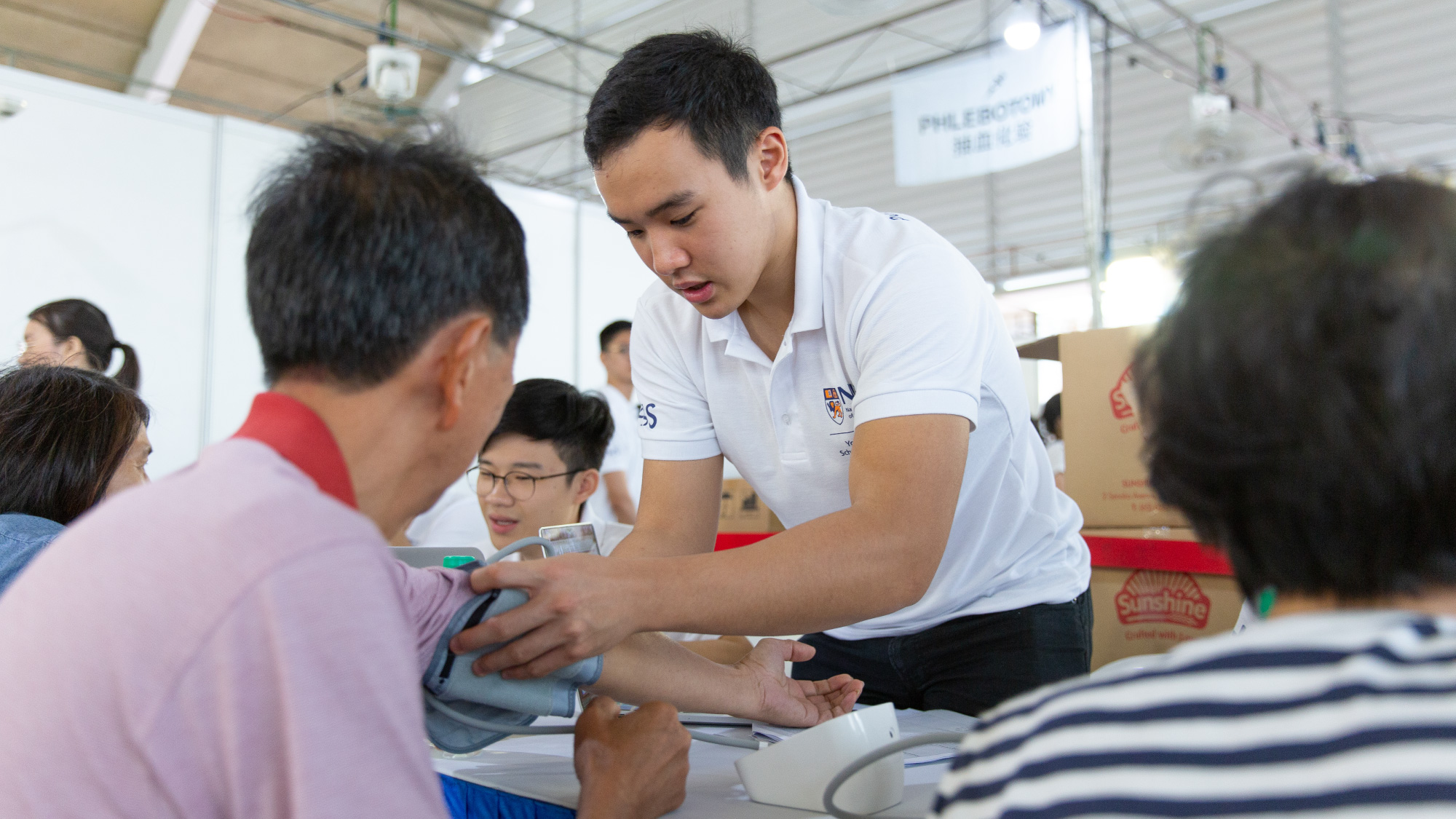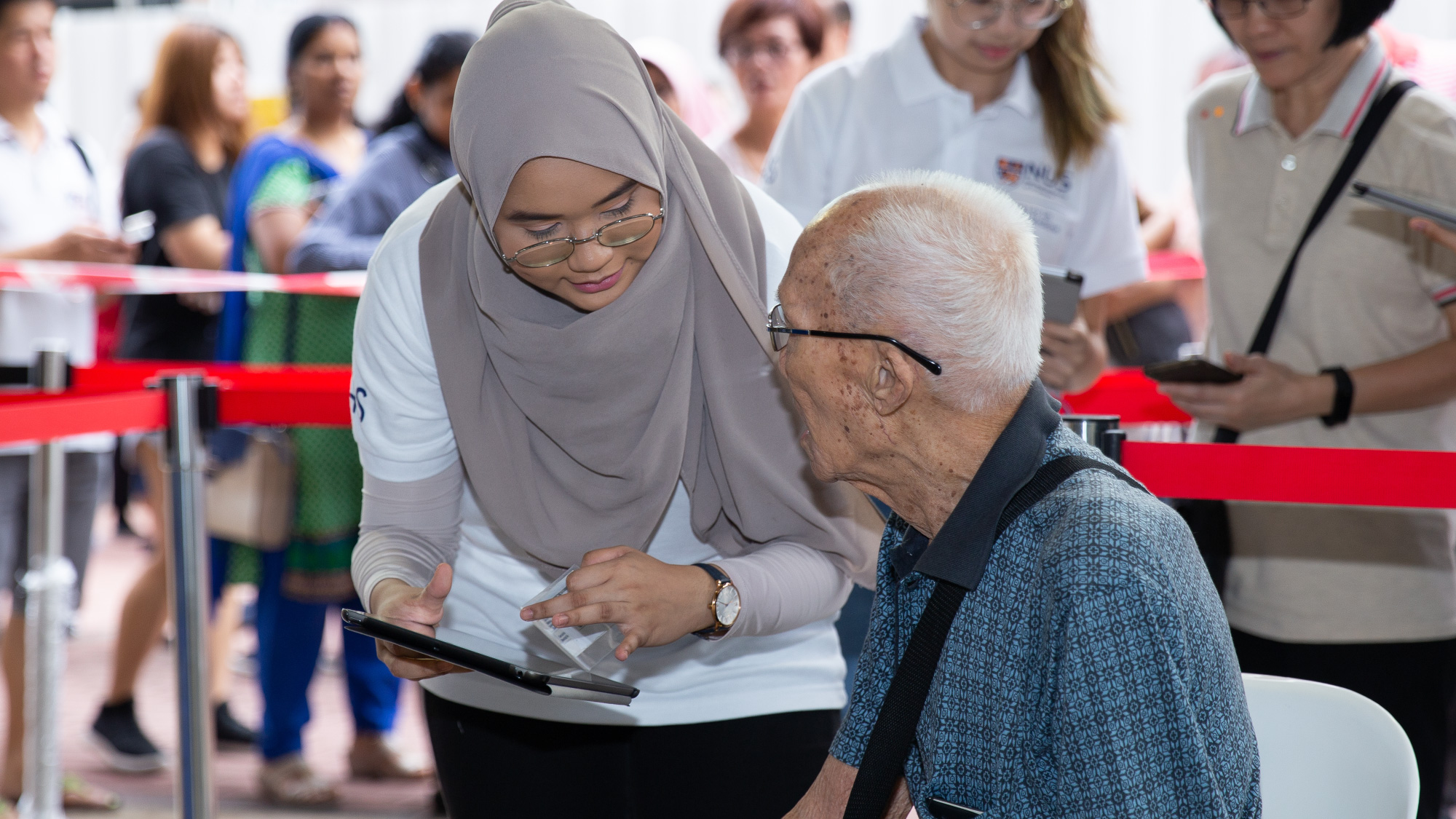Public Health Service – Towards a Healthier Nation, One Community at a Time
By Ryan Lim Mao Heng, Goh Ying Xian and Drusilla Tan Kai Yan
Committee Members, Public Health Service 2018
Phase III Medicine Students
In 2004, a group of medical students from NUS Yong Loo Lin School of Medicine (NUS Medicine) spotted a gap in Singapore’s healthcare landscape – health screenings were not readily available for the general population. After months of hard work, planning and dedication, the students gathered enough funds and resources to organise the School’s first student-led population health screening project. It offered four basic screening modalities at no cost to residents of HDB apartments where the screening was held.
Since then, the annual event has come to be known as the Public Health Service. It has grown from strength to strength. The latest edition, PHS 2018, featured 10 screening modalities, complete with a health exhibition and an inaugural health carnival run by students from secondary schools and junior colleges, mentored by the PHS committee. Over the years, PHS has diversified from being primarily a health screening to a health service with three distinctive approaches – primary prevention (health education),
secondary prevention (health screening), and follow-up. PHS has also become a community service programme that all NUS Medicine students are expected to participate in. It has become a flagship project that stands at the crossroads of medical education, inter-professional collaboration and community service
Through the years, PHS has always stayed true to its motto of “Promoting Health, Spreading Awareness”. Ultimately, PHS aims to promote positive health seeking behaviour and healthy lifestyles in the general public, as well as to provide resources to link participants to established health organisations for follow-up for any abnormalities picked up during the health screening. In a bid to reach out to various communities in Singapore, PHS has served more than 18,000 residents in Ang Mo Kio, Toa Payoh, Clementi and Jurong.

While the core aims have remained unchanged, PHS has evolved in response to developments in Singapore’s healthcare landscape. Over the last few years, the government has been increasingly providing low-cost and comprehensive public health screenings to the public. In 2017, the Screen for Life (SFL) programme was rolled out. Singapore citizens can get a health screening done for as low as $5, $2 for those with a CHAS card, while it is free for the Pioneer Generation.
Heartened by this, PHS organisers reviewed its objectives and programmes. Were our efforts now replicated by the increased frequency of other health screenings? How could PHS remain relevant to the community and continue to promote health effectively?
The Young Health Ambassadors’ Programme (YHAP) was thus established in 2015 to provide health education to secondary school students, who would then act as health ambassadors to pass on healthy living messages to their parents and seniors at home. We hoped that by addressing the youth, we would be empowering them to make a difference to those in their families, friends, and communities.
Fast-forward to 2018, and the YHAP has successfully provided health talks to over 4,000 students and mentored over 150 students, providing all our youth participants with health knowledge and skills to positively influence those around them. PHS has plans to expand our primary prevention efforts to increasingly involve the community as a whole, going beyond the youth.
The PHS flagship annual health screening also has much to offer above and beyond other regular health screenings. Recognising the need to address mental health issues that are becoming more prevalent in the population, mood and cognitive screening for the elderly was introduced in 2017. PHS doctors’ consultation service during the health screenings has also given participants valuable personalised health advice and helped them to take charge of their own health. In 2018, PHS managed to partner the Health Promotion Board (HPB) and the Agency for Integrated Care (AIC) to offer geriatric participants with a comprehensive functional screening encompassing vision, hearing and oral checks.
Apart from a wide range of screening modalities, PHS has always maintained the practice of providing a robust follow-up for all participants. In 2018, eligible participants received a free GP consultation in addition to their screening reports. Participants with screening abnormalities picked up during functional screening are being followed-up through more specific screenings and consultations with specialists as required.
In the coming years, it is our sincere and fervent hope that PHS will continue to evolve in response to the healthcare challenges faced by Singaporeans, so as to continue to meet existing healthcare gaps in the community. We are confident that each generation of NUS Medicine students will build on the efforts of their predecessors and bring PHS to greater heights, and help to make Singapore a healthier nation, one community at a time.

